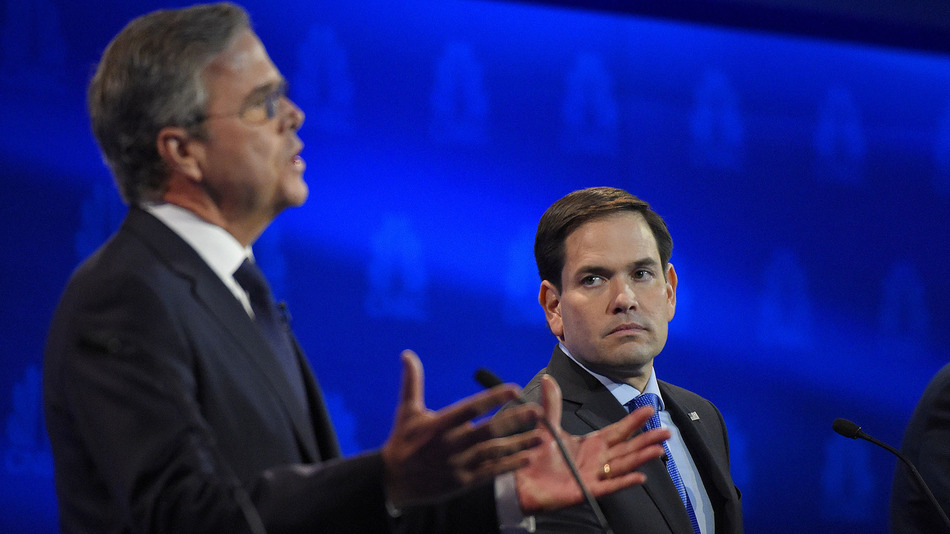In the third presidential debate of 2016, the political protégé beat the mentor.
For 15 years, former Florida Gov. Jeb Bush and Sen. Marco Rubio have shared an enduring bond from Miami to Washington. But Wednesday night’s debate put the fissures in their relationship into focus. And it took just 20 minutes to tell which Floridian would come out on top. When Bush launched a broadside on Rubio’s patchy Senate voting record, Rubio deftly deflected the attack, turning it into one of his best moments of the night.
Bush attempted to dig into Rubio on the issue of his missed Senate votes since he declared his presidential bid. On the campaign trail, Bush has called on members of Congress who don’t do their jobs to have their pay cuts.
Rubio had already deftly handled a question from CNBC moderator Carl Quintanilla on the topic, blaming the bias of the mainstream or liberal media. But Bush pressed on, trying to turn the issue into a breakout moment.
“Could I bring something up here?” Bush asked. “I’m a constituent of the senator and I helped him and I expected that he would do constituent service, which means that he shows up to work.”
“Marco, when you signed up for this, this was a six-year term, and you should be showing up to work,” he added.
The contrast was stark. Bush’s points were clipped and awkward, and the former Florida governor seemed uncomfortable at every turn, even when he asked whether Rubio was taking a “French work week,” which drew some applause from the crowd.
Rubio was ready for this moment.
“I get to respond, right?” he asked the moderators, pointing out that Arizona Sen. John McCain, the party’s nominee in 2008, missed Senate votes during his campaign too.
“You know how many votes John McCain missed when he was carrying out that furious comeback that you’re now modeling after?” asked Rubio.
He also seemed incredulous that that the man he first crossed paths with in the 1990s when Rubio was running for city commissioner and Bush was running for governor, could be making such an attack.
Political aides, Rubio suggested, must have convinced him it was a good idea.
Bush tried to break in, saying that wasn’t the case, but Rubio flipped the script and said that he wasn’t “running against anyone else on this stage” and reminded the audience that the goal is to beat the Democratic nominee in 2016.
The applause was deafening. Point, Rubio.
Bush entered the debate with flagging poll numbers and having just ordered across-the-board pay cuts and cut staff positions at his Miami headquarters. He needed a strong showing on Wednesday night to quell the concerns of skittish donors and to breathe life into his campaign.
His failure to capitalize, and the boost his performance gave Rubio, will make the next few weeks more important than ever for Bush. And there’s another Republican presidential debate in less than two weeks, a platform that so-far has done Bush more harm than favors. It could also be a critical test for Rubio, to see if he can capitalize on his newfound momentum and attract some of Bush’s massive donor base.






